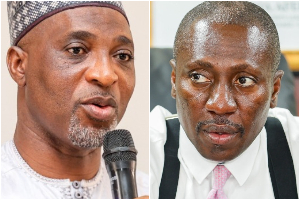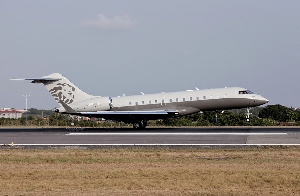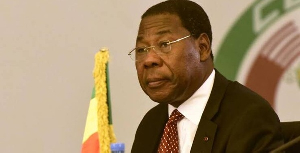By Kojo E. Bibah
I listened to President John Dramani Mahama when he hosted and addressed some senior journalists on pertinent issues plaguing our country at the Flagstaff House on Friday 22nd March, 2013. Among a host of issues he touched on was the vexatious issue of lack of adequate water supply to the Ghanaian people, especially for those of us living in the Tema-Accra metropolitan area. He enumerated the managerial incompetence that has bedevilled the company over the years, and it was visible from the demeanour of the president that he is indeed a frustrated man. Apart from the managerial incompetence that he touched on, which of course emanates from the amorphous and humongous nature regarding the organisational set up of the GWCL, he also admitted that lack of investments for many years have all contrived to result in the current situation we find ourselves as a country. It is a shame that in year 2013, the people of Accra and Tema, especially those receiving the water from the Kpong line, would have to use containers to go and ‘hunt’ for water, even as we unashamedly tout this country as having attained a middle income status. What pretentious hypocrisy on our part and on the part of our development partners and their institutions to have conferred on us this undeserved accolade. And so the question I ask is; did we go or did we come? What image do we cast to first time visitors to our country; that we are unable to solve the basic need of our people, which is water? As for matters relating to electricity supply I reserve that for another day.
The President is justifiably right to be angry at the situation, and to blame a chunk of it on management systems currently existing at GWCL that do not deliver results. Over the years the State Enterprises Commission (is it still in existence?) has had the habit of signing a so called Performance Contracts with state institutions/organisations that draw subventions from the Consolidated Funds, but I doubt if they review at year-end their performances to ensure that the targets were met in a particular year. This otherwise fine and appropriate management tool then becomes as useless as the paper on which they are signed. I believe a thousand and one reasons would have been assigned why performance targets were not met in a particular yet and so on, and yet these management teams were kept in place to the detriment and growth of these organisations. This coupled with political cronyism and plain thievery have become the bane of our public sector organisations in this our beloved country. This is so heart wrenching, to say the least!
So the question is what do we do as a country in order to address this precarious situation which directly affects our health and productivity as a people? I have some suggestions and I hope those who are paid huge sums of money and given all kinds of perks ranging from V8s and free ‘everything’ must begin to ‘think’ and solve our problems instead of always coming in the open to ‘express concern’ over the very issues for which they are in office in the first place.
A brief history will put this discussion in context. In the early 1990s a raft of reforms were introduced in the water sector which culminated in the creation of the Community Water and Sanitation Agency (CWSA) from the Ghana Water and Sewerage Corporation, which later became a limited liability company (Ghana Water Company Ltd.) were all aimed at injecting efficiency into the water delivery system. Of course, later on the Water Resources Commission (WRC) was also established to supervise the water resources, both surface and ground, in the country. The idea was to ensure that the CWSA focuses on the community and rural water delivery while the GWCL has jurisdiction over urban water systems. Over the years however, the result does not show any improvement in the water delivery systems, especially in the urban areas, while in the rural areas and small towns, boreholes have been sunk and small town water systems built to address the water situation. The truth is that, and speaking for Accra, I can say that the situation has worsened over the years, and it’s about time government took a drastic and bold decision to address the current difficulties and to avert further deterioration and its recurrence in future. What are some of the solutions we can adopt and what lessons can we learn from best practices from other countries? I propose that the route to dealing with the current challenge lies squarely in how fast and effectively we decentralise our governance structures and systems. The solutions lie in decentralising the delivery of water supply in the country especially in urban areas! Anything other than this approach would not yield the result we all yearn for; which is adequate and constant supply of water to consumers.
The history of Ghana’s decentralisation programme is all too familiar and in this piece I do not intend to rehash and to bore you with it. But suffice it to say that as a country we have embarked upon an ambitious decentralisation programme since 1988, but it appears the current administration is speeding up that process with coming into being of the Local Government Service and the introduction of composite budgeting as a key component in this agenda. The decentralised departments which are created under the Metropolitan, Municipal and District Assemblies (MMDAs) are expected /required to work up directly up to the MMDAs by providing services that are required in the management of these assemblies, e.g. water and sanitation services. It is within this context that I see the current urban water delivery fits. I am sure the sceptics would be quick to raise the perennial doubt of ‘lack of capacity’ of the Assemblies, and further question the efficiency and effectiveness issues that confront the assemblies currently.
But I daresay in the current chaos that has been created within the urban water systems, there is no better solution than to have the Assemblies assume full control over the provision of water in their localities. This is the model a lot of countries have adopted and is working very well for them. Denmark and South Africa are good examples. Why can’t we as a country do same or adopt and modify it to suit our circumstances? This is not rocket science, as they say. It takes commitment and dedication to confront the ‘demons’ that have plagued the urban water delivery for so long and deal with it once and for all. We can do it and I hope the President takes pragmatic steps and adopt home-grown solutions to fix the water situation in our country. The lazy and cheaper option is to accept another ‘cooked solution’ from the World Bank, which would dangle in front us seemingly juicy financial packages which have all failed to address our core issues as a country. I am not by any means suggesting that we do away the World Bank (is that even possible or desirable?) or for that matter other international financial institutions (IFIs); not at all. I am only saying we must have alternatives when we go out to negotiate for such financial assistance and must convince our benefactors that we know how to solve our problems on our own. Of course ‘expert’ advice from these institutions can also be ‘localised’ to deal with our developmental challenges. Pardon me for the little digression but I know the influence these so called development partners wield when it comes to issues such as this. The AquaVitens-Rand management contract with the GWCL and the World Bank is a case in point. We will talk about the details some other time.
In proposing solutions to the water crises we currently have and to prevent future occurrences in the urban areas, and taking Accra and Tema into consideration, I hold the view that we must decentralize and cede completely the delivery of water services to the Assemblies. How do we do this? We take a cue from the energy sector and split the urban water sub-sector and then make the GWCL bulk supplier of water to the Assemblies, just as VRA, Bui Authority, Asogli Power Plant and other Independent Power producers (IPPs) do in the energy sector. The Assemblies would take full responsibility for distribution to the various homes and also erect stand pipes at vantage points for people who cannot have home connections to access water within their jurisdictions. With this approach or model the Assemblies would be compelled to embark on proper planning and zoning of their districts, metropolis and municipalities. It would enhance revenue mobilisation of the Assemblies through property rates collection, since the Assemblies would now be in a position to have proper and reliable data on all properties in their districts, municipalities and metropolis. This integrated approach to planning at the Assembly level is a sure way of dealing with the haphazard manner in which houses are built in the current environment and it would make it easy for utility connections to be made. As regards the current arrangement it appears the GWCL and Assemblies are working at cross purposes; in other words the two institutions work in separate silos.
The arrangements which I have outlined, at least the sketch as I have tried to elaborate, would be worked on into fine details. I am aware that the Assemblies may not be in position to carry out this effort by themselves, but they can buy this expertise from the open market through competitive bidding. Bringing in the private sector into the water delivery system in this manner is a better way of assuaging the fear of the anti-privatization coalition of water in the country. Whether we like it or not there should be an element of the principle of open market competition that must drive our state enterprises to deliver, otherwise we would remain in an endless cycle of mediocrity and inefficiency to the detriment of all of us. This is the time to begin the discussion on how to clear the mess in the urban water delivery system devoid of emotive submissions which have failed to address the core issues that confront us a nation. It’s time to cut the GWCL to pieces and let the Assemblies take charge, so we can relate to them as institutions which are established to provide services. This approach would also reduce the illegal connection which has become the bane of the GWCL and has resulted in the loss of revenue to the company. The private operators, on behalf of the Assemblies would sign performance contracts every year and these contracts will be reviewed to determine whether they are being met or not.
If the government agrees to adopt this approach what it would mean in effect is that government institutions which owe huge sums of money to GWCL can no longer do so and must pay up their bills at the end every month. Some of the inefficiencies with the GWCL, apart from the water leakages in the pipes and illegal tappings have been the refusal of state institutions to pay their bills; ranging from schools, hospitals and clinics to barracks etc.
I know the current situation is dire but it’s not out of control. The current set up of the GWCL has outlived its relevance and usefulness. There is need for complete overhaul of the system and the time to begin is now. Even though the GWCL has been changed from a state corporation to a pseudo-limited liability company, its values and culture remain the same. In such an environment it is difficult to expect any drastic change and improvement in its service delivery. It’s a typical old wine in new bottle; it will taste the same.
Is the President ready to bite the bullet and make the tough calls? If he did and can communicate his vision very clearly regarding the urban water sub-sector, I can guarantee him that Ghanaians would support him all the way through.
Email: elibibah@yahoo.com
Opinions of Thursday, 11 April 2013
Columnist: Bibah, Kojo E.














